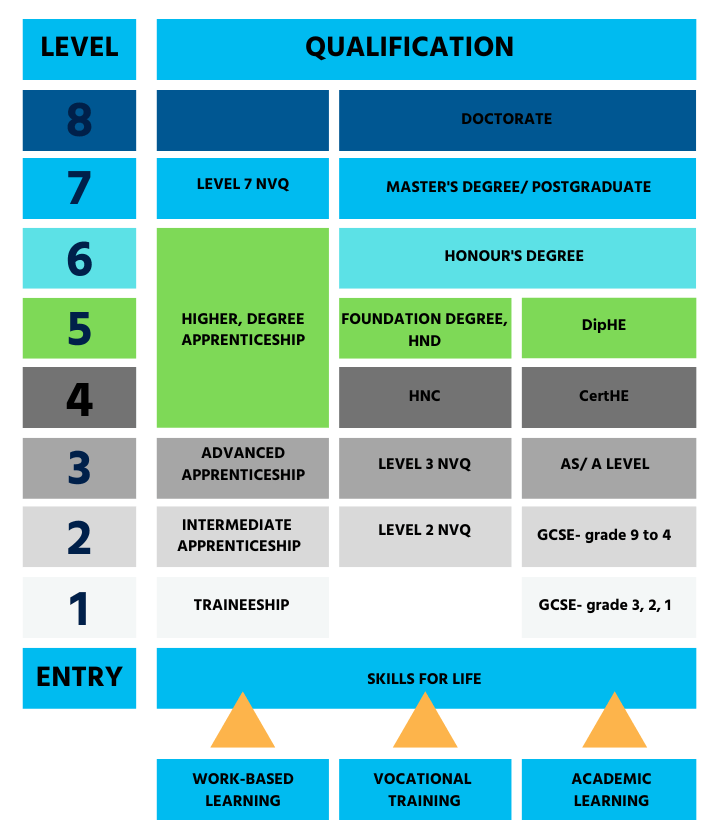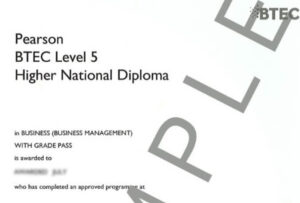A quick guide to the main types of certification available and why accreditation and awarding bodies are important.
In the UK, a wide range of qualifications and certificates are categorised as level 5. These courses are advanced programmes considered to be on par with the second year of an undergraduate degree. Students taking these courses would typically have already completed two years of college, A levels or equivalent.
Below is a quick guide to the most common on-campus and online level 5 certificate courses and how they fit into the qualifications framework.
- Diploma Of Higher Education (DipHE)
- Foundation Degree
- Higher National Diploma (HND)
- Level 5 Award
- Level 5 Certificate
- Level 5 Diploma
- Level 5 NVQ
What is a Level 5 qualification?
A level 5 qualification is a higher education certificate that demonstrates learning at university level. Individuals who take these certificates gain a strong foundation in the subject area.
Level 5 education and training can be academic, vocational or a mixture of both, such as foundation degrees. These courses provide a pathway to earning a full degree or career progression. For many learners, a level 5 qualification is their first step towards achieving a master’s degree.
What Can You Do With a Level 5 Diploma?
Depending on the certificate type and subject area, you can do the following with a level 5 qualification.
- Join the third and final year of an undergraduate degree at a university
- Gain professional body membership
- Boost career progression and earning.
Level 5 qualifications range from vocational to academic. They demonstrate a deeper level of learning and understanding of complex problems. They show a high level of expertise and are used in many sectors as progression markers for career progression.
Upon successful completion of a level 5 diploma, a popular progression route is to join the third and final year of an undergraduate bachelor’s degree programme. Top-up degrees are bachelor’s programmes designed especially for level 5 diploma graduates.
Qualifications Framework
In England, Wales, and Northern Ireland, learning is mapped to 9 qualification framework levels. These nine levels represent learning from essential skills and entry-level qualifications to advanced Doctoral research.
Level 5 education and training ranges from 100% academic such as DipHEs’ to entirely vocational NVQs.

Regulated Qualifications Framework (RQF)
If you want to join a level 5 course, it is wise to check and ensure that the qualification is listed on the RQF. The RFQ recognition means that the course has been assessed and benchmarked for quality and learning outcomes.
Accreditation and being registered on the RQF is essential if you want to use the qualification to enter a university or other training at level 6 or above. There are currently 99 level 5 course providers in the UK registered on the RQF. We show you on the course page which accrediting body awards the certificate.
Awarding Bodies and Certificates
There are two main types of level 5 qualifications—those awarded by private training providers and those awarded by universities.
For example, if you took a Higher National Diploma (HND) from a college, the actual award would be from Pearson (Pearson is a for-profit company that designs and awards HNDs). While the college did the actual teaching and course delivery. Below is an example of the top half of a business management HND certificate.

Universities’ qualifications are different as universities provide the teaching and award the qualification. You can check if a UK university is accredited here.
Types of Level 5 Diploma
Below are some of the UK’s most common level 5 qualifications and certificates.
NVQ Level 5
NVQs (National Vocational Qualifications) are vocational qualifications that recognise work-based and demonstrate competency, knowledge and understanding in a chosen career path.
They are an excellent way for employees without formal education to access recognised qualifications and demonstrate essential skills and knowledge.
Active IQ
BIIAB
City & Guilds
CMI
GQA
iCQ
NCFE
NOCN
Pearson
ProQual
SFJ Awards
Skillsfirst
SQA
TQUK
Higher National Diploma (HND)
Higher National Diploma courses (HNDs) are work-related higher education qualifications. A full HND covers levels 4 (HNC*) and 5 (HND) and is the equivalent of the first two years of university study.
*Higher National Certificates are level 4 qualifications that are stand-alone certificates but are most commonly taken apart of an HND.
HND Awarding bodies- 1
Pearson
Level 5 Diploma
A level 5 diploma can cover many types of courses, and they can vary in length and credits. Typically they are the equivalent of one year of full-time study at the same level as the second year of an undergraduate degree.
However, if you are taking a level 5 diploma to gain access to a top-up degree, you should check that the course is suitable. Ask the education provider how many credits the course is worth. Some courses do not have enough credits for Approved Prior Learning. To join a top-up degree, students need to demonstrate 120 credits at level 4 and 120 credits at level 5.
ABBE
ABE
ABMA
Accounting Technicians Ireland
Agored Cymru
AIM
Ascentis
ASQ
ATHE
BBO
BCS
BHSQ
BIIAB
CFI
CICM
CIH
CILT(UK)
CIOB
City & Guilds
CMI
CPCAB
DAO
EAL
ETCAL
FAQ
Focus Awards
GA
Gateway Qualifications
Gem-A
GQA
GQAL
Highfield
IAO
IAT
iCQ
IFE
IMI
ISM
ISP
IWFM
Lantra Awards
LASER
LIBF
LRN
MPQC
NCC Education
NCFE
NCTJ
NEA
NISQ
NOCN
OAL
OCN NI
Open College Network West Midlands
OTHM
Pearson
PIABC
Prince’s Trust
ProQual
QA
QUALIFI
REC
RSL
RSPH
SEG Awards
SFEDI Awards
SFJ Awards
Skillsfirst
SQA
TCL
TQUK
UWL
VTCT
Foundation Degree (FD)
A foundation degree is a mixture of academic study and work-related projects. They are awarded by universities and are often delivered in partnership with colleges. They are the equivalent of the first two-thirds of an undergraduate degree. They are often used as a pathway to a full degree.
FD Awarding Bodies
UK Universities
Diploma of Higher Education (DipHE)
A Diploma in Higher Education is an academic qualification equivalent to the first two-thirds of a degree. Students can take them as a stand-alone certificate or, in some cases, leave an undergraduate degree after the first two years of study.
DipHE Awarding Bodies
UK Universities
